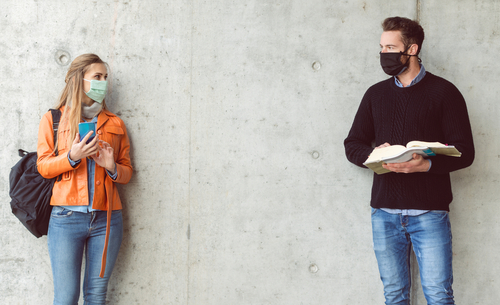
Related resource: Top ten Online Colleges for a Bachelor’s Degree
Swift Moves by Colleges Have Likely Saved Lives
The Centers for Disease Control and Prevention offered recommendations in February and March of 2020 to colleges and universities regarding how to deal with the COVID-19 pandemic. Institutions like the University of Georgia, Gonzaga University, and Villanova University made immediate moves to cancel or suspend study abroad sessions based on that guidance.
As of late March, no outbreaks had been centered on college campuses. The quick work of college administration personnel to close campuses across the nation has likely been a factor in reducing the spread of disease on those campuses and throughout the close quarters often present on college campuses.
According to details shared by CNN, Universities and colleges that have closed their campuses and moved instruction online include the University of Southern California, Georgetown University, the University of Florida, Emory University, Northwestern University, and Boston University. Those institutions represent states across the country; virtually every state has seen the majority of its colleges close or restrict campus access.
Steps Being Taken by Colleges
A recent report from National Public Radio (NPR) details several steps taken by the nation’s colleges in the wake of the pandemic. Those steps have included the following.
1. Classes moved online
2. Study abroad sessions canceled
3. Chinese students aided with counseling
4. Guidelines published for students and parents
5. Potential long-term closures arranged
6. Student populations educated on COVID-19
Based on these steps, colleges have been able to stay ahead of coronavirus outbreaks on their campuses, according to an article from Inside Higher Education.
Some Colleges Haven’t Closed or Have Already Reopened
The vast majority of schools around the United States have closed their doors in favor of delivering their classes via the internet or through distance education. However, Liberty University in Virginia has opened its doors to students after just a week of closure during what was the university’s annual spring break week.
According to details published by local a local Fox 8 news station in Virginia, more than 1,100 students returned to the campus despite virtually all other college campuses around the country remaining closed for the duration of the spring session. An order from the governor of Virginia closed all grammar schools for the rest of the academic year but didn’t order that colleges close, too.
Although the move by Liberty University is surprising in the wake of a national shutdown of non-essential services, it remains to be seen whether the university’s decision to open its doors will result in an increase in the number of COVID-19 infections.
Conclusion
As far as the nation’s other colleges are concerned, the widespread availability of online and distance learning has likely allowed many of the nation’s institutions of higher learning to remain “open” without actually exposing students to the dangers of on-campus classrooms during the pandemic. The swift moves made by the nation’s colleges and universities to shut down operations have shown that most schools have already had the tools necessary to handle the COVID-19 pandemic before it began to spread across the planet.
Related Resources:
